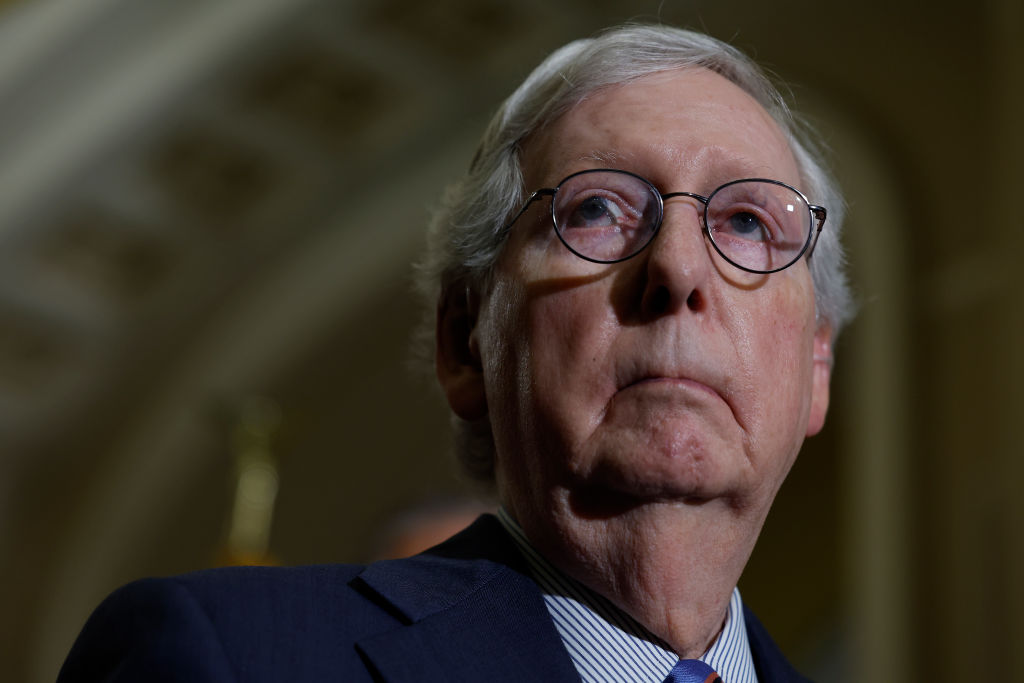A vocal minority of Republican senators continued their push Monday to stall the election of party leadership in the wake of the GOP’s underwhelming performance in midterm elections. The debate could fracture the party into two camps: those who blame current GOP leadership for last week’s midterm results and those who blame former President Donald Trump.
The senators pushing for delay—in a process that typically amounts to little drama—have given a variety of reasons for their position. Some say they want Republican Senate candidate Herschel Walker to have a say in the process should he defeat incumbent Democratic Sen. Raphael Warnock in Georgia’s December 6 runoff. Others are taking aim at Senate Minority Leader Mitch McConnell and other party leaders for the Senate Leadership Fund’s (SLF) midterm spending decisions and declining to release a concrete policy agenda for candidates to run on in the midterms, among other concerns.
As of Monday evening, at least 10 Republican senators were calling for a delay.
“What do we stand for? What are we hell-bent to get done?” Florida Sen. Rick Scott, chairman of the National Republican Senatorial Committee (NRSC), asked on Fox News over the weekend. “The leadership in the Republican Senate says, ‘No, you cannot have a plan. We’re just going to run against how bad the Democrats are.’ And, actually, then they cave into the Democrats.”
Earlier this year, Scott published a GOP campaign strategy that included controversial proposals such as requiring all Americans to pay income taxes and eliminating “all federal programs that can be done locally.” McConnell ridiculed it days after its release. That standoff fueled months-long jockeying between the two leaders over a number of campaign strategy questions, including how money ought to be distributed among candidates, whether candidate quality matters in swing states, and what role Republican leaders should play in Senate primaries.
Lingering disagreements over how the NRSC and the McConnell-aligned SLF spent their campaign resources throughout the cycle have exacerbated these tensions. Whereas Scott has come under fire for spending too much of the NRSC’s limited cash at the beginning of the cycle, McConnell has taken hits from Scott and others for publicly criticizing “candidate quality” of this year’s slate of GOP Senate hopefuls and for investing in a few Republican Senate primary candidates more likely to support him as leader.
The SLF also complained that McConnell had to spend heavily in states like Ohio and Pennsylvania where Republican Senate candidates raised paltry funds early in the cycle.
“I want to know what leadership’s got in mind for our game plan for America,” GOP Sen. Mike Braun of Indiana told The Dispatch Monday in supporting the delay. He wouldn’t commit to supporting McConnell.
Some of this is a messaging game: A handful of GOP senators have reason to signal to their voters that they oppose McConnell, even if no concrete challenger emerges.
“I’m not going to vote for Sen. McConnell,” GOP Sen. Josh Hawley of Missouri told reporters Monday evening. But he declined to say who he hopes will run to replace him. “I’ve made that clear. I don’t care who runs or doesn’t run.”
Hawley has criticized Republican Party leaders for the election results last week.
Sen. Marco Rubio of Florida, who beat his Democratic challenger by more than 16 points last week, said a delay is necessary to figure out “why in the friendliest conceivable environment” Republicans might be worse off than they were just two years ago.
“There has to be a conversation about the political apparatus that supports these campaigns, decisions that are being made about how money’s allocated and what we’re going to be about for the next two years,” Rubio said in an interview. “After a leadership election, no one’s going to want to talk about that. They’ll move on.”
Others made their demands clear in a letter circulated to colleagues over the weekend, Politico reported. Senators are expected to discuss the situation during the GOP conference’s policy luncheon on Tuesday.
No formal challenge to McConnell has actually emerged—though some senators suggested Monday evening that a challenge could be announced soon. Scott refused to rule one out Monday afternoon.
“We don’t know of anyone else,” Sen. Mike Lee, who signed last week’s letter, said.
“We’ll find out,” Sen. Ted Cruz, another co-signer, said.
Meanwhile, McConnell’s allies insist the consensus opinion is to move forward with elections Wednesday. He said Monday that he “of course” has the votes to lead the conference in the new Congress.
“I don’t understand what delaying an uncontested election gets you,” Texas Republican Sen. John Cornyn said Monday.
Wyoming Sen. Cynthia Lummis on Monday blamed former President Donald Trump for the GOP’s “underperformance” this cycle. She told reporters she views Florida Gov. Ron DeSantis as the “current leader of the Republican Party” and argued Trump should wait until after the Georgia Senate runoff to announce his 2024 plans.
And Republican Sen. Thom Tillis told The Dispatch he supports McConnell Monday evening.
“I believe he’ll probably win the vast majority of the conference.”







Please note that we at The Dispatch hold ourselves, our work, and our commenters to a higher standard than other places on the internet. We welcome comments that foster genuine debate or discussion—including comments critical of us or our work—but responses that include ad hominem attacks on fellow Dispatch members or are intended to stoke fear and anger may be moderated.
With your membership, you only have the ability to comment on The Morning Dispatch articles. Consider upgrading to join the conversation everywhere.